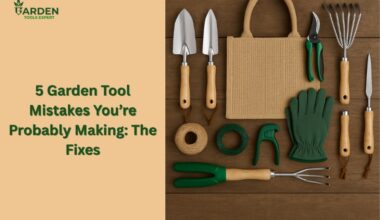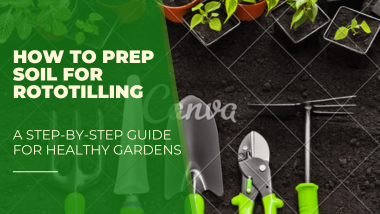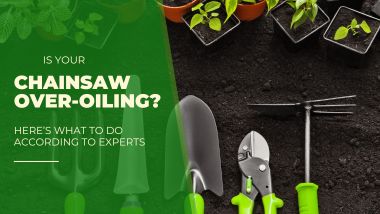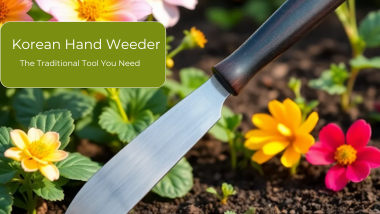
Table of Contents
Chemical fertilizer vs organic fertilizer is one of the first debates every beginner gardener eventually runs into. Picture this: you’ve just planted your first tomatoes, started a flower bed, or maybe you’re trying to revive a dry patch of grass
Suddenly, you’re faced with two very different bags on the store shelf. One promises fast, visible results, while the other focuses on long-term soil health and sustainability. The question is: which should you choose?
The truth is, the answer isn’t as simple as picking one over the other. Both chemical fertilizers and organic fertilizers come with unique benefits and their fair share of drawbacks.
Chemical fertilizers are like giving your plants an energy drink; they act fast, delivering nutrients immediately, and often produce quick improvements in growth and color. But just like too many energy drinks can leave a person worn out, overusing them can hurt your soil in the long run.
On the flip side, organic fertilizers are more like a slow, home-cooked meal. They feed your plants gradually while also enriching your soil, encouraging microbes and earthworms to thrive. The downside?
Results can take longer to see, and beginners may feel discouraged when progress isn’t immediate.
For DIY gardeners, the chemical fertilizer vs organic fertilizer debate can feel overwhelming. Do you chase quick results, or do you invest in building healthier soil for future seasons?
In this guide, we’ll explore the six most important pros and cons of each, provide practical DIY tips, and explain exactly when to use them so you can grow a garden that thrives.
Fertilizer Basics for DIY Gardeners

Before diving deeper into the chemical fertilizer vs organic fertilizer debate, it’s important to understand what fertilizers actually do for your garden.
In the simplest terms, fertilizers supply plants with the essential nutrients they can’t always get from soil alone. Just like people need a balanced diet to stay strong and healthy, plants need a steady supply of food to thrive, resist pests, and produce flowers or vegetables.
The three main nutrients every DIY gardener should know are often referred to as NPK:
- Nitrogen (N): Fuels leafy green growth, making it essential for lawns, herbs, and leafy vegetables.
- Phosphorus (P): Builds strong roots and supports the development of flowers, fruits, and seeds.
- Potassium (K): Strengthens overall plant health, improves disease resistance, and helps plants withstand stress.
Think of NPK like vitamins for your plants; without them, growth slows, leaves yellow, and blooms fail to appear.
While some soils naturally contain small amounts of these nutrients, many beginner DIYers quickly realize that their plants still need an extra boost. That’s where fertilizers step in.
But here’s the key point: not all fertilizers work the same way. Chemical fertilizers deliver concentrated nutrients for quick results, while organic fertilizers improve soil structure and feed plants slowly over time.
Knowing this difference is the foundation of the chemical fertilizer vs organic fertilizer conversation.
Fertilizers aren’t just “plant food,” they’re also problem-solvers. Yellowing leaves? That usually signals a nitrogen deficiency.
Poor flowering? Low phosphorus could be the culprit. Weak, disease-prone plants? They may need more potassium. Understanding how fertilizers fill these nutrient gaps makes it much easier to choose the right type for your garden goals.
What Are Chemical Fertilizers?

Chemical fertilizers are man-made plant foods created through industrial processes that combine nutrients like nitrogen, phosphorus, and potassium (labeled as NPK). Unlike organic options, these fertilizers deliver nutrients in a highly concentrated form, making them available almost immediately after application.
For beginners trying to understand the chemical fertilizer vs organic fertilizer debate, think of chemical fertilizers as an energy drink for your plants, fast and effective, but not always the healthiest long-term choice.
Pros of Chemical Fertilizers
- Fast results: Nutrients are immediately available, so plants show quick improvements.
- Exact nutrient balance: You can pick formulas tailored to specific plant needs.
- Widely available: Found in almost every garden center or hardware store.
Cons of Chemical Fertilizers
- Soil damage: Long-term use can harm soil fertility and kill beneficial microbes.
- Overuse risk: Too much can “burn” plants or cause imbalances.
- Environmental concerns: Runoff can pollute nearby rivers, lakes, or groundwater.
When to Use Chemical Fertilizers
- To quickly revive yellowing or weak plants.
- When you need a fast nutrient boost mid-season.
- For container gardens where soil nutrients run out quickly.
Extra DIY Tip: If you’re growing vegetables in pots, a balanced chemical fertilizer like 10-10-10 can give your plants a quick boost, but go light! Too much too fast is like giving a kid unlimited candy.
What Are Organic Fertilizers?

Organic fertilizers come from natural sources such as compost, manure, bone meal, or seaweed. Instead of being manufactured in a lab, they’re made from living or once-living materials.
For beginners exploring the chemical fertilizer vs organic fertilizer debate, think of organic fertilizers as a slow-cooked meal for your plants, nutritious and long-lasting, but not as instantly powerful as chemical options.
Pros of Organic Fertilizers
- Improves soil health: Adds organic matter, supports earthworms, and feeds microbes.
- Eco-friendly: Reduces harmful runoff and is safer for the environment.
- Safe for long-term use: Gentle on plants, with little risk of over-fertilization.
Cons of Organic Fertilizers
- Slower results: Plants take longer to show visible changes.
- Nutrient levels vary: Ratios of NPK aren’t always exact.
- Less convenient: Some types smell, take up space, or need extra work.
When to Use Organic Fertilizers
- When building soil health for future seasons.
- In vegetable or herb gardens, where food safety matters.
- If you want a natural, eco-friendly gardening approach.
Extra DIY Tip: If you’re composting kitchen scraps, you’re already making your own organic fertilizer. Peels, coffee grounds, and eggshells can all enrich soil naturally.
Chemical vs Organic Fertilizer: Head-to-Head Comparison
For DIY beginners, the chemical fertilizer vs organic fertilizer choice can feel tricky. Both can help your plants grow, but they work in very different ways. Here’s a simple breakdown to help you see the differences side by side:
| Factor | Chemical Fertilizers | Organic Fertilizers |
| Speed of Results | Fast plants absorb nutrients almost instantly | Slow nutrients are released gradually |
| Soil Health | Can damage microbes and reduce fertility with overuse | Improves soil structure and supports beneficial life |
| Nutrient Balance | Precise ratios tailored to plant needs | Varies depending on the source |
| Ease of Use | Clear instructions on labels, easy to apply | May require composting or mixing |
| Environmental Impact | Runoff risk, pollution concerns | Safer, eco-friendly option |
| Best For | Quick fixes, container gardens | Long-term soil health, food crops |
In short, chemical fertilizers are great when your plants need an urgent nutrient boost, while organic fertilizers shine when you’re focused on long-term soil and garden health.
Many DIY gardeners discover that the chemical fertilizer vs organic fertilizer debate doesn’t always need one “winner.” Instead, a balanced approach using each where it makes the most sense can give your garden the best of both worlds.
Beginner Tips for Using Fertilizers Safely
Whether you choose chemical fertilizers or organic ones, applying them the right way is just as important as picking the type.
Many beginners in the chemical fertilizer vs organic fertilizer debate focus only on “which one is better,” but safe use ensures your plants actually benefit without causing damage.
Start Small
Always begin with a light application. Over-fertilizing, especially with chemical fertilizers, can “burn” plants or stress the soil. Organic fertilizers are gentler, but too much compost or manure can still overwhelm young plants.
Read the Label
Every fertilizer bag comes with instructions. For chemical fertilizers, this means following the recommended dosage and frequency. With organic options, pay attention to how and when to apply, since nutrients release slowly.
Use the Right Tools
Simple tools like a scoop, watering can, or gardening gloves make the process easier and safer. Container gardens may need more frequent fertilizer, while raised beds or ground plots can be fed less often.
Store Safely
Keep fertilizers in a dry, cool place away from kids and pets. Chemical products especially need extra caution to prevent accidental exposure.
By keeping these tips in mind, you’ll not only make the most of your choice in the chemical fertilizer vs organic fertilizer debate but also build a safe and thriving DIY garden.
Common Beginner Mistakes to Avoid
When you’re just starting, it’s easy to make a few fertilizer slip-ups. Understanding these common mistakes can save your garden from stress and help you get more out of both chemical and organic options.
Many DIYers who get stuck in the chemical fertilizer vs organic fertilizer debate actually struggle more with how they use fertilizers rather than which one they choose.
Overusing Fertilizers
A common beginner mistake is thinking “more is better.” With chemical fertilizers, this can lead to nutrient burn and weak, stressed plants. Even organic fertilizers, though gentler, can cause problems if applied in heavy amounts.
Expecting Instant Results with Organics
Organic fertilizers work slowly by building up soil health. New gardeners sometimes get discouraged when they don’t see immediate changes. Patience is key. Organics are an investment in long-term growth.
Ignoring Soil Health
Some beginners rely only on chemical fertilizers without checking the condition of their soil. Healthy soil is the foundation of a thriving garden, and organic fertilizers or compost can help maintain that balance.
Mixing Without Knowledge
Combining chemical and organic fertilizers without understanding their effects can cause nutrient imbalances. Beginners should start simple and add complexity later.
Avoiding these mistakes ensures your choice in the chemical fertilizer vs organic fertilizer journey actually benefits your plants instead of holding them back.
Real-Life DIY Example: Learning Through Experience
Sometimes, the best way to understand the chemical fertilizer vs organic fertilizer debate is through real-life experience.
Take Sarah, a beginner DIY gardener who started her very first backyard vegetable patch with tomatoes and peppers. Excited but unsure, she decided to experiment with both fertilizer types.
On one side of her garden, Sarah used a store-bought chemical fertilizer. Within a week, the plants looked greener, fuller, and more vibrant. It felt like an instant success.
But a few weeks later, she noticed the soil becoming dry and crumbly, and the plants seemed to need more frequent feeding to stay healthy.
On the other side, she added organic compost mixed with bone meal. The results weren’t as dramatic in the first two weeks; growth was slower, and the plants looked average compared to their neighbors.
But over the next month, the soil stayed rich and moist, and the plants gradually grew sturdier, with stronger stems and more fruit.
Sarah’s experiment showed her that chemical fertilizers can deliver a quick boost, while organic fertilizers create lasting benefits for soil and plant health.
For beginners, this simple side-by-side test is one of the easiest ways to see how both fertilizers work in practice.
Conclusion: Choosing What Works for Your Garden
At the end of the day, the chemical fertilizer vs organic fertilizer debate isn’t about which one is “right” or “wrong.” It’s about choosing what works best for your garden goals.
Chemical fertilizers give you quick, visible results when your plants need a fast boost, while organic fertilizers focus on long-term soil health and sustainability. Many DIY gardeners discover that the smartest approach is a balance using each at the right time to get the best of both worlds.
Now it’s your turn: Which fertilizer do you prefer in your garden, chemical, organic, or a mix of both? Share your experience in the comments below. And if you know a friend or fellow DIYer who’s still unsure about fertilizers, share this post with them so they can make confident choices, too.
Your garden doesn’t have to be complicated. With the right knowledge and tools, you can grow with confidence one fertilizer choice at a time.
Frequently Asked Questions (FAQs)
1. What is the main difference between chemical fertilizer vs organic fertilizer?
Chemical fertilizers deliver nutrients quickly in a concentrated form, while organic fertilizers release nutrients slowly and improve long-term soil health.
2. Is chemical fertilizer better than organic fertilizer for beginners?
Not always. Chemical fertilizers give fast results, but organic fertilizers build healthier soil over time. Beginners should use a mix depending on their garden goals.
3. Can I use chemical fertilizer and organic fertilizer together?
Yes, many gardeners combine both. Chemical fertilizers give immediate growth, while organic fertilizers support soil fertility for the future.
4. Which is cheaper: chemical fertilizer vs organic fertilizer?
Chemical fertilizers are usually cheaper upfront, but organic fertilizers may save money long-term by improving soil and reducing future fertilizer needs.
5. Are chemical fertilizers harmful to the environment?
Overuse of chemical fertilizers can cause soil damage and water pollution. Using them sparingly and combining with organic fertilizers helps reduce risks.
6. What are the 3 most important nutrients in fertilizers?
Nitrogen (N) for leaves, Phosphorus (P) for roots and flowers, and Potassium (K) for overall plant health. Both chemical and organic fertilizers provide these nutrients.
7. Which is better for vegetables: chemical fertilizer vs organic fertilizer?
For fast-growing veggies, chemical fertilizers can help quickly. For long-term healthy soil and tastier produce, organic fertilizers are often preferred.






